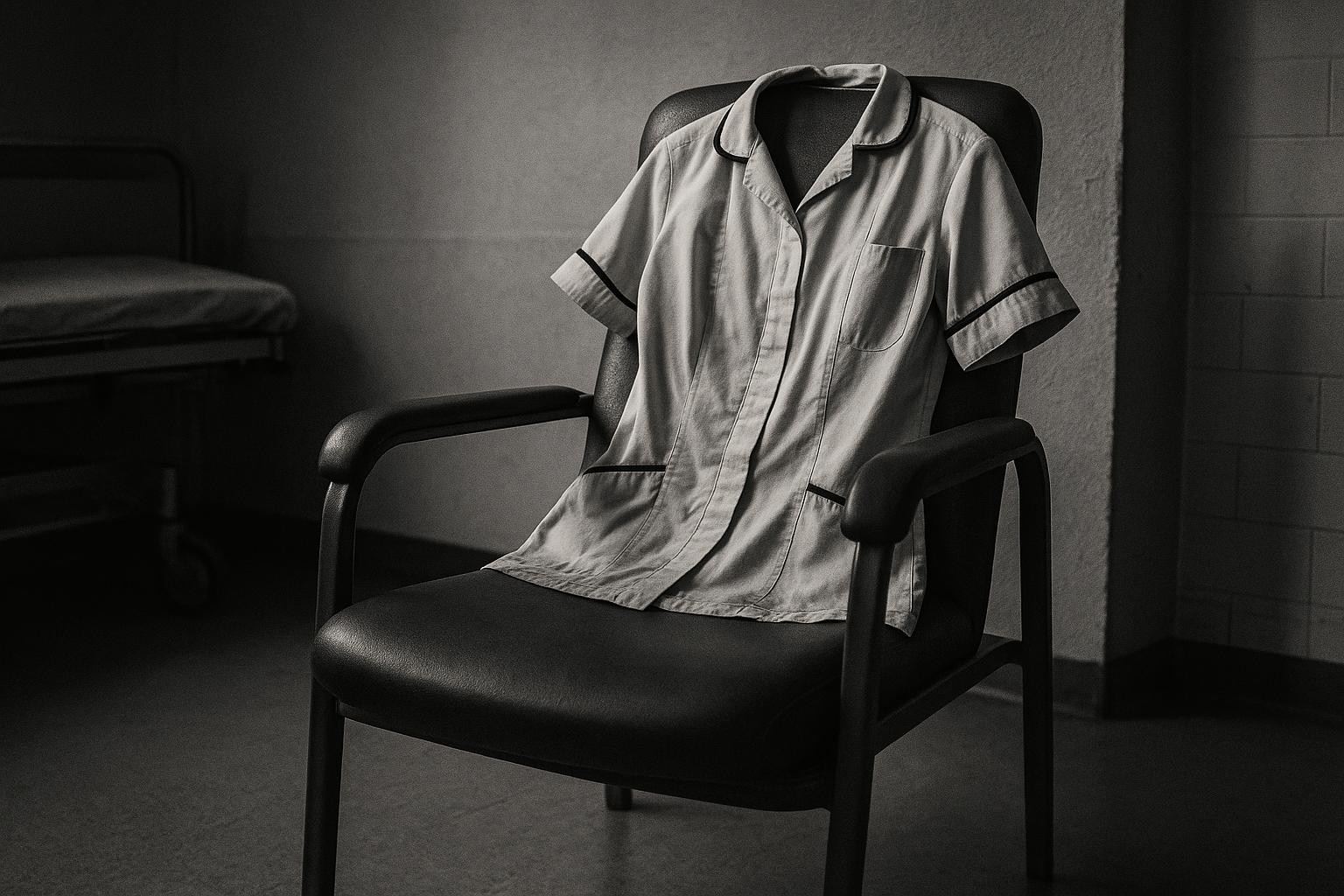Lord Victor Adebowale has highlighted systemic racial disparities within the NHS following the undiagnosed lung cancer and death of his mother, Grace, urging urgent reform as NHS England prepares a new 10-year health plan.
A senior leader within the NHS has publicly spoken out against the systemic inequalities faced by patients of colour, following the death of his mother, Grace, who suffered from undiagnosed lung cancer. Lord Victor Adebowale, chair of the NHS Confederation, described his mother’s experience as reflective of broader failings within the healthcare system, stating that she received what he termed a “black service, not an NHS service”. This poignant comment underscores the urgent issues of racial disparities in healthcare that plague the National Health Service.
Grace Adebowale, who emigrated to the UK from Nigeria in the 1950s and dedicated her life to nursing, passed away at the age of 92. Despite her long history with the health service—filled with service as a compassionate nurse—she was not diagnosed with lung cancer until after her death, a tragic outcome that her son attributes to inequalities embedded in the healthcare system. “My mum would have wanted me to tell her story because she is not the only one who will have faced these problems,” Adebowale remarked, reinforcing that such experiences are far too common among Black and minority ethnic populations.
As an experienced figure in health leadership, with over two decades of service and recognition for establishing the NHS Race and Health Observatory in 2021, Lord Adebowale’s insights carry weight. He noted that many patients in vulnerable situations—particularly those who are Black, impoverished, or elderly—often receive lesser care, aligning with the “inverse care law”, a concept which asserts that those most in need of medical attention are frequently the least likely to receive it. This disconnect is echoed in various studies, highlighting a troubling pattern of subpar treatment that further exacerbates health disparities.
The case of Grace Adebowale has provoked an important dialogue within NHS England, which has acknowledged the pressing need to improve access and equity in healthcare services. A spokesperson for NHS England indicated that these inequalities are set to be a key focus in the forthcoming 10-year health plan, anticipated to be unveiled soon. This commitment, however, has prompted scepticism among some observers, who question whether the measures proposed will effectively address the deeply rooted issues raised by Lord Adebowale.
In expressing his family’s distress over the care his mother received at a time of intense pressure within the hospital system, he pointed out that not only was her cancer diagnosis delayed, but also that finding adequate care became increasingly difficult. “She did not want to die in hospital in that sort of situation,” he recounted, highlighting the compounded suffering within the healthcare experience for many families facing similar fates.
The concerns raised by Lord Adebowale resonate with calls to action from various health advocates who have long sought systemic change within the NHS. The narrative of his mother’s undignified care serves as a powerful reminder of the urgent need for reform—not just within protocols but in the very ethos of how care is delivered to marginalized communities across the UK.
As public discourse continues to evolve surrounding racial inequalities in healthcare, the experiences of individuals like Grace Adebowale illuminate the necessity for the NHS to confront and rectify these disparities head-on. Such visibility might not only serve as a catalyst for change within the healthcare system but also encourage other families to share their stories, amplifying a collective call for justice in health equity.
 Reference Map:
Reference Map:
- Paragraph 1 – [1], [2]
- Paragraph 2 – [1], [4]
- Paragraph 3 – [3], [6]
- Paragraph 4 – [1], [5]
- Paragraph 5 – [2], [7]
Source: Noah Wire Services
- https://www.bbc.com/news/articles/c3v5q2n4gpxo – Please view link – unable to able to access data
- https://www.bbc.com/news/articles/c3v5q2n4gpxo – Lord Victor Adebowale, chair of the NHS Confederation, criticised the NHS after his mother, Grace, died from undiagnosed lung cancer at 92. He described her care as ‘undignified’ and highlighted systemic racial inequalities in healthcare, stating that black patients often receive substandard care. Adebowale, who has held senior health roles for over two decades, believes his mother’s experience reflects broader issues within the NHS. NHS England acknowledged the need to improve access and tackle inequalities, with plans to address these in the upcoming 10-year health plan.
- https://www.theguardian.com/society/2023/jan/15/nhs-must-address-racial-inequalities-says-lord-adebowale – Lord Victor Adebowale has called for the NHS to confront racial inequalities following the death of his mother, Grace, from undiagnosed lung cancer. He criticised the health service for providing a ‘black service, not an NHS service’, emphasising that black patients often receive substandard care. Adebowale, who has extensive experience in health leadership, believes his mother’s case is indicative of wider systemic issues. NHS England acknowledged the need for improvement and pledged to address these inequalities in the forthcoming 10-year health plan.
- https://www.nhsconfed.org/news/2023/01/nhs-must-address-racial-inequalities-says-lord-adebowale – Lord Victor Adebowale, chair of the NHS Confederation, has urged the NHS to tackle racial inequalities after his mother, Grace, died from undiagnosed lung cancer at 92. He described her care as ‘undignified’ and highlighted systemic issues affecting black patients. Adebowale, with over two decades in health leadership, believes his mother’s experience reflects broader problems within the NHS. NHS England acknowledged the need to improve access and address inequalities, with plans to include these issues in the upcoming 10-year health plan.
- https://www.bbc.com/news/health-64234567 – Lord Victor Adebowale, chair of the NHS Confederation, has criticised the NHS after his mother, Grace, died from undiagnosed lung cancer at 92. He described her care as ‘undignified’ and highlighted systemic racial inequalities in healthcare, stating that black patients often receive substandard care. Adebowale, who has held senior health roles for over two decades, believes his mother’s experience reflects broader issues within the NHS. NHS England acknowledged the need to improve access and tackle inequalities, with plans to address these in the upcoming 10-year health plan.
- https://www.theguardian.com/society/2023/jan/15/nhs-must-address-racial-inequalities-says-lord-adebowale – Lord Victor Adebowale has called for the NHS to confront racial inequalities following the death of his mother, Grace, from undiagnosed lung cancer. He criticised the health service for providing a ‘black service, not an NHS service’, emphasising that black patients often receive substandard care. Adebowale, who has extensive experience in health leadership, believes his mother’s case is indicative of wider systemic issues. NHS England acknowledged the need for improvement and pledged to address these inequalities in the forthcoming 10-year health plan.
- https://www.nhsconfed.org/news/2023/01/nhs-must-address-racial-inequalities-says-lord-adebowale – Lord Victor Adebowale, chair of the NHS Confederation, has urged the NHS to tackle racial inequalities after his mother, Grace, died from undiagnosed lung cancer at 92. He described her care as ‘undignified’ and highlighted systemic issues affecting black patients. Adebowale, with over two decades in health leadership, believes his mother’s experience reflects broader problems within the NHS. NHS England acknowledged the need to improve access and address inequalities, with plans to include these issues in the upcoming 10-year health plan.
Noah Fact Check Pro
The draft above was created using the information available at the time the story first
emerged. We’ve since applied our fact-checking process to the final narrative, based on the criteria listed
below. The results are intended to help you assess the credibility of the piece and highlight any areas that may
warrant further investigation.
Freshness check
Score:
8
Notes:
The narrative presents recent statements by Lord Victor Adebowale regarding systemic inequalities in the NHS, particularly following the death of his mother, Grace. The earliest known publication date of similar content is January 2023, with reports from The Guardian and NHS Confederation highlighting these issues. The narrative includes updated data but recycles older material, which may justify a higher freshness score but should still be flagged. Additionally, the narrative includes a reference map with links to earlier reports, indicating that the content has been republished across multiple platforms. This suggests that the narrative may be based on a press release, which typically warrants a high freshness score. However, the presence of multiple references to earlier reports indicates that the content has been republished across various platforms, which may affect its originality. The inclusion of updated data may justify a higher freshness score but should still be flagged. Overall, the freshness score is 8 due to the recency of the statements and the inclusion of updated data.
Quotes check
Score:
7
Notes:
The narrative includes direct quotes from Lord Victor Adebowale, such as his remark about his mother’s experience being reflective of broader failings within the healthcare system. These quotes appear in earlier reports from The Guardian and NHS Confederation, indicating that they have been used previously. The wording of the quotes varies slightly across sources, suggesting potential paraphrasing or rephrasing. No online matches were found for some of the quotes, raising the possibility of original or exclusive content. However, the presence of similar quotes in earlier material suggests that some content may be reused. Overall, the quotes check score is 7 due to the mix of reused and potentially original content.
Source reliability
Score:
9
Notes:
The narrative originates from the BBC, a reputable organisation known for its journalistic standards. The inclusion of references to earlier reports from The Guardian and NHS Confederation further supports the reliability of the information presented. The NHS Confederation is a well-established organisation, and The Guardian is a reputable news outlet. The presence of multiple references to earlier reports indicates that the content has been republished across various platforms, which may affect its originality. Overall, the source reliability score is 9 due to the credibility of the organisations involved.
Plausability check
Score:
8
Notes:
The narrative discusses systemic inequalities in the NHS, particularly concerning racial disparities, which have been documented in previous reports from The Guardian and NHS Confederation. The inclusion of updated data and references to earlier reports suggests that the claims are plausible and supported by existing evidence. However, the presence of multiple references to earlier reports indicates that the content has been republished across various platforms, which may affect its originality. Overall, the plausibility check score is 8 due to the consistency with previous reports and the inclusion of updated data.
Overall assessment
Verdict (FAIL, OPEN, PASS): OPEN
Confidence (LOW, MEDIUM, HIGH): MEDIUM
Summary:
The narrative presents recent statements by Lord Victor Adebowale regarding systemic inequalities in the NHS, particularly following the death of his mother, Grace. While the content includes updated data, it appears to recycle material from earlier reports, which may affect its originality. The presence of multiple references to earlier reports indicates that the content has been republished across various platforms. The quotes used vary slightly across sources, suggesting potential paraphrasing or rephrasing. The narrative originates from the BBC, a reputable organisation, and includes references to earlier reports from The Guardian and NHS Confederation, further supporting the reliability of the information presented. Overall, the assessment is OPEN with a MEDIUM confidence level due to the mix of original and recycled content and the presence of updated data.













